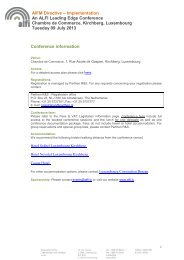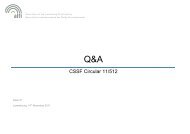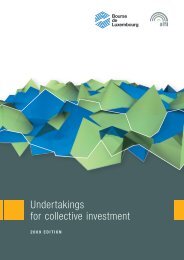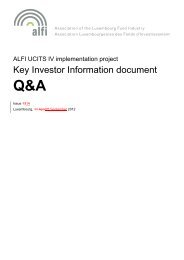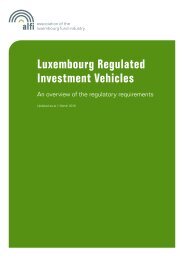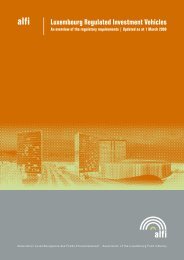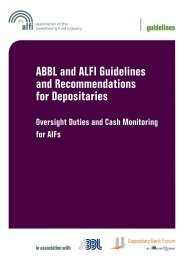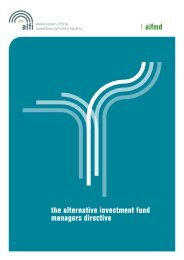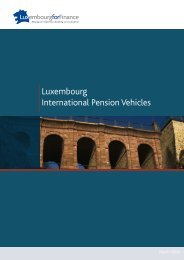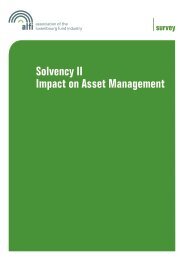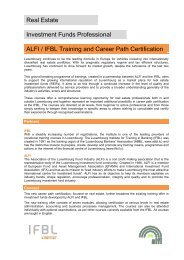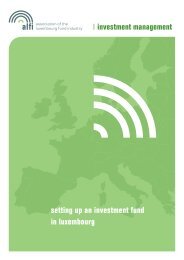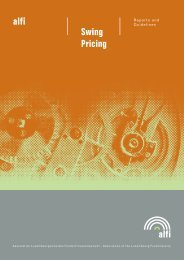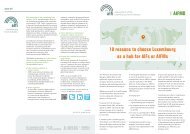Luxembourg Real Estate Investment Vehicles - Alfi
Luxembourg Real Estate Investment Vehicles - Alfi
Luxembourg Real Estate Investment Vehicles - Alfi
You also want an ePaper? Increase the reach of your titles
YUMPU automatically turns print PDFs into web optimized ePapers that Google loves.
<strong>Luxembourg</strong><br />
<strong>Real</strong> <strong>Estate</strong> <strong>Investment</strong> <strong>Vehicles</strong><br />
MIPIM 2009
Contents<br />
2<br />
Preface<br />
3<br />
<strong>Luxembourg</strong> real estate market<br />
4<br />
Unregulated real estate investment vehicles<br />
4 Corporate companies<br />
5 Securitisation vehicles<br />
7<br />
Regulated real estate investment vehicles<br />
7 Undertakings for collective investment (UCIs)<br />
9 Specialised investment funds (SIFs)<br />
11 Sociétés d’investissement en capital à risque (SICARs)
Preface<br />
This brochure has been prepared jointly by <strong>Luxembourg</strong> for Finance (LFF) and the<br />
Association of the <strong>Luxembourg</strong> Fund Industry (ALFI) in order to provide general<br />
background information on the legal and taxation aspects of unregulated and<br />
regulated real estate vehicles domiciled in the Grand Duchy of <strong>Luxembourg</strong>.<br />
The choice of a real estate vehicle will depend on the type of funding that needs to<br />
be raised, the proposed investor base, the type of investments to be made and any<br />
specific tax considerations.<br />
The <strong>Luxembourg</strong> legal framework is diverse and flexible enough to fulfill a wide<br />
range of investor needs. The taxation regime is also a key factor when considering<br />
whether to establish an unregulated or regulated real estate investment vehicle for<br />
international investors.<br />
This brochure is not intended to be a comprehensive study. Readers should seek<br />
the advice of qualified professionals before making any decision as to the most<br />
appropriate <strong>Luxembourg</strong> real estate investment.<br />
This document reflects the legal situation as at 15 February 2009.<br />
2
<strong>Luxembourg</strong><br />
real estate market<br />
The market for real estate investment<br />
vehicles is constantly developing to<br />
provide investors with flexible and<br />
innovative real estate investment<br />
products. The growth in the number of<br />
real estate investment vehicles set up in<br />
<strong>Luxembourg</strong> has outpaced the European<br />
average and all current market indicators<br />
show that this trend will continue for<br />
the future.<br />
• a flexible onshore regime for setting<br />
up highly sophisticated and tax<br />
efficient real estate vehicles investing<br />
internationally;<br />
• the presence of experienced service<br />
providers.<br />
The optimal choice of a real estate<br />
investment vehicle will depend largely<br />
on the type of funding that needs to<br />
be raised, the proposed investor base,<br />
any tax considerations and the type of<br />
investments. The current <strong>Luxembourg</strong><br />
legal framework is diverse and flexible<br />
enough to fulfill a wide range of investor<br />
needs and the <strong>Luxembourg</strong> taxation<br />
regime is a key factor when considering<br />
whether to choose an unregulated or<br />
regulated real estate investment vehicle<br />
for international investors.<br />
In 2008, <strong>Luxembourg</strong> was the leading<br />
European domicile for vehicles investing<br />
in international real estate. 29 regulated<br />
<strong>Luxembourg</strong> real estate investment funds<br />
were launched in 2008, bringing the total<br />
number of real estate funds established<br />
and operated out of <strong>Luxembourg</strong> to<br />
118 (137 units) with total net assets of<br />
€ 20.9 billion. Net assets have increased<br />
by 35.5% since 2007. These figures only<br />
refer to <strong>Luxembourg</strong> real estate vehicles<br />
regulated by the <strong>Luxembourg</strong> regulator,<br />
the “Commission de Surveillance du<br />
Secteur Financier” or “CSSF”. The<br />
inclusion of unregulated <strong>Luxembourg</strong><br />
real estate investment vehicles would<br />
increase these figures considerably.<br />
There are several key factors to the<br />
success of <strong>Luxembourg</strong>, including:<br />
• ongoing political support for the<br />
development of the financial services<br />
industry;<br />
• increasing investor awareness of<br />
<strong>Luxembourg</strong> funds;<br />
• a high level of investor protection;<br />
Growth in the number of <strong>Luxembourg</strong> real estate fund units<br />
140<br />
120<br />
100<br />
80<br />
60<br />
40<br />
20<br />
0<br />
as at 31 December 2008<br />
5<br />
11<br />
Sources: ALFI / CSSF<br />
Growth in the number of SICARs<br />
250<br />
200<br />
150<br />
100<br />
50<br />
3<br />
7<br />
Institutional funds / SIFs<br />
Part II<br />
5<br />
7<br />
6<br />
7<br />
14<br />
8<br />
2000 2001 2002 2003 2004 2005 2006 2007 2008<br />
as at 31 December 2008<br />
98<br />
29<br />
12<br />
45<br />
19<br />
165<br />
83<br />
21<br />
217<br />
121<br />
16<br />
0<br />
3<br />
34<br />
2004 2005 2006 2007 2008<br />
Sources: ALFI / CSSF<br />
3
<strong>Luxembourg</strong><br />
<strong>Real</strong> <strong>Estate</strong> <strong>Investment</strong> <strong>Vehicles</strong><br />
Unregulated real estate<br />
investment vehicles<br />
Corporate companies<br />
<strong>Luxembourg</strong> is often used by professional,<br />
institutional and private investors<br />
to set up companies acquiring real<br />
estate.<br />
Legal features<br />
In accordance with the law of 10 August<br />
1915 on commercial companies, as<br />
amended, companies may be incorporated<br />
in <strong>Luxembourg</strong>, as a:<br />
• public limited company<br />
• private limited company<br />
• limited partnership<br />
• partnership limited by shares<br />
• cooperative company.<br />
In practice, the legal form of a public limited<br />
company (Société Anonyme or SA)<br />
or a private limited company (Société à<br />
Responsabilité Limitée or Sàrl) is most<br />
commonly chosen for companies invest -<br />
ing in real estate. One of the main<br />
features of these two forms of company<br />
is the limited liability of each shareholder<br />
to the amount of his participation in<br />
the company (this also applies to the<br />
partnership limited by shares).<br />
The following table provides a comparison of the main features of the<br />
most popular corporate forms:<br />
Public Limited<br />
Company (SA)<br />
Private Limited<br />
Company (Sàrl)<br />
Incorporation Notarial deed required Notarial deed required<br />
Capital<br />
≥ € 31,000<br />
No minimum par value as from<br />
1/1/2007<br />
≥ € 12,500<br />
No minimum par value as from<br />
1/1/2007<br />
Shares Registered or bearer Registered only<br />
Transfer of shares<br />
Free<br />
Subject to certain conditions<br />
being met<br />
Shareholders ≥ 1 1 to 40<br />
Liabilities<br />
Assembly<br />
Management<br />
Statutory<br />
auditor<br />
Shareholders’ liability is<br />
limited to the amount of their<br />
participation<br />
1 annual general assembly<br />
required<br />
≥ 3 directors (if there is more<br />
than one shareholder)<br />
or a Conseil de Surveillance &<br />
Directoire<br />
Required<br />
Shareholders’ liability is<br />
limited to the amount of their<br />
participation<br />
1 annual general assembly required<br />
if the number of members/<br />
partners is ≥ 25<br />
≥ 1 manager<br />
Required<br />
only if the number of<br />
partners is ≥ 25<br />
Accounts Annual Annual<br />
Independent<br />
auditor’s report<br />
Required if certain size<br />
thresholds are exceeded<br />
Required if certain size<br />
thresholds are exceeded<br />
4
Tax features<br />
According to the “lex rei sitae” principle,<br />
income derived from real estate is generally<br />
taxed in the country of situation<br />
of the real estate. If the real estate is<br />
held through a company, the sale of<br />
the shares is, according to the ordinary<br />
rules of double taxation treaties, taxed<br />
in the country of residence of the seller.<br />
However, <strong>Luxembourg</strong> companies which<br />
invest directly or indirectly in real estate<br />
are subject in <strong>Luxembourg</strong> to:<br />
• a fixed registration duty of € 75 which<br />
is due upon incorporation of a company,<br />
modification of its articles<br />
of association or transfer of registered<br />
office of a company to <strong>Luxembourg</strong>,<br />
• net worth tax of 0.5%,<br />
• municipal business tax and corporate<br />
income tax of 28.59% (for companies<br />
located in <strong>Luxembourg</strong> City) on all their<br />
income.<br />
It is possible to leverage the investment<br />
through a mixture of equity and debt<br />
and the <strong>Luxembourg</strong> vehicle may benefit<br />
(via applicable double tax treaties or the<br />
EU Parent-Subsidiary Directive) from tax<br />
exemptions on income deriving from real<br />
estate situated abroad.<br />
Dividends and gains from qualifying<br />
shareholdings in property companies are<br />
usually also exempt under the <strong>Luxembourg</strong><br />
domestic participation exemption.<br />
In addition, there is normally no net<br />
worth tax due on directly held foreign<br />
real estate or shareholdings in foreign<br />
property companies as a result of tax<br />
treaties and domestic law exemptions.<br />
If the income is not exempt under a tax<br />
treaty, all investment expenses (property<br />
tax, interest on loans etc.) and costs<br />
associated with real estate management<br />
are deductible from taxable income.<br />
Securitisation vehicles<br />
The <strong>Luxembourg</strong> law of 22 March 2004<br />
on securitisation as amended contains a<br />
broad definition of securitisation and a<br />
complete legal framework for securitisation<br />
transactions, including real estate<br />
transactions. It is sufficiently flexible for<br />
promoters to develop workable and<br />
effective structures for securitisation<br />
transactions, whilst ensuring a high level<br />
of investor protection.<br />
Legal features<br />
Securitisation is a technique which<br />
allows to convert assets (or the risks<br />
linked to the assets), which are not<br />
marketable, into transferable securities,<br />
and then to transfer these assets (or the<br />
risks linked to the assets) to a specific<br />
entity. The entity which owns, acquires<br />
or assumes all rights in connection with<br />
a specific asset or pool of assets transfers<br />
this asset to a securitisation vehicle<br />
through the issue of transferable securities<br />
which are backed/collateralised by<br />
the underlying assets.<br />
A wide range of assets, tangible or intangible,<br />
movable or immovable, including<br />
real estate, may be securitised as long as<br />
a value may be reasonably ascertained<br />
5
and there is a reasonable likelihood of<br />
current or future income or gain. Securitisation<br />
can take the form of a transfer of<br />
ownership of the assets (true sale) or of<br />
a transfer of the risks linked to the asset<br />
(synthetic).<br />
In <strong>Luxembourg</strong>, securitisation is accessible<br />
to a wide range of investors (retail<br />
or institutional), directly or indirectly.<br />
Securitisation vehicles are, in principle,<br />
unregulated. However, a securitisation<br />
vehicle which issues securities to the<br />
public on a continuous basis (normally<br />
interpreted as being more than three<br />
times a year) falls under the supervision<br />
and regulation of the CSSF, although<br />
offers to institutional investors and<br />
private placements do not constitute<br />
a “public offer”.<br />
There are two types of securitisation<br />
vehicle which may be set up under<br />
<strong>Luxembourg</strong> law: securitisation funds<br />
and securitisation companies.<br />
Securitisation funds have no legal personality<br />
and, therefore, must be managed<br />
by a management company. Securitisation<br />
funds may be structured in the form<br />
of a contractual common fund (Fonds<br />
Commun de Placement or FCP) as either<br />
a co-ownership of assets (co-propriété)<br />
where there is a right to the securitised<br />
assets underlying the investor’s securities<br />
or as a fiduciary property (patrimoine<br />
fiduciaire), where the management<br />
company holds the securitised assets as<br />
fiduciary property.<br />
Securitisation companies may take the<br />
legal form of a:<br />
• public limited company (Société<br />
Anonyme or SA);<br />
• private limited company (Société à<br />
Responsabilité Limitée or Sàrl);<br />
• partnership limited by shares (Société<br />
en Commandite par Actions or SCA);<br />
• cooperative company organised as<br />
a public limited company (Société<br />
Coopérative organisée sous forme de<br />
Société Anonyme or SCoSA).<br />
Securitisation vehicles may:<br />
• issue equity or debt securities;<br />
• value, and make a return from,<br />
securities, depending on the underlying<br />
assets;<br />
• create multiple compartments, with<br />
different assets and liabilities, which<br />
may be liquidated separately;<br />
• issue securities to the public (if an SA<br />
or SCA).<br />
The annual accounts must be audited by<br />
an independent auditor approved by the<br />
CSSF.<br />
Tax features<br />
The tax treatment of securitisation funds<br />
is similar to that of an FCP since securitisation<br />
funds are not subject to income<br />
or wealth taxes. Securitisation funds are<br />
also exempt from subscription tax (taxe<br />
d’abonnement).<br />
Securitisation companies are subject<br />
to corporate income tax and municipal<br />
business tax of 28.59% (for companies<br />
located in <strong>Luxembourg</strong> City) as are other<br />
commercial companies but may deduct,<br />
without limit, dividends, interest payments<br />
and commitments towards their<br />
investors which de facto may reduce<br />
their tax basis to zero. They are exempt<br />
from net worth tax. A fixed registration<br />
duty of € 75 is due upon incorporation.<br />
6
<strong>Luxembourg</strong><br />
<strong>Real</strong> <strong>Estate</strong> <strong>Investment</strong> <strong>Vehicles</strong><br />
Regulated real estate<br />
investment vehicles<br />
Undertakings for collective<br />
investment (UCIs)<br />
Most real estate investment vehicles<br />
established in <strong>Luxembourg</strong> are undertakings<br />
for collective investment (UCIs).<br />
<strong>Real</strong> estate UCIs are those:<br />
• which invest their funds in real estate;<br />
• place their shares or units with the public<br />
by means of a public or private offer;<br />
• whose exclusive object is to invest in<br />
real estate assets in accordance with<br />
the principle of risk diversification.<br />
Legal and regulatory features<br />
<strong>Real</strong> estate UCIs may be set up either in<br />
corporate form (i.e. Société d’Investissement<br />
à Capital Variable or SICAV and<br />
Société d’Investissement à Capital Fixe or<br />
SICAF) or in a contractual common fund<br />
form (FCP). A key determining factor in<br />
the selection of one of these structures is<br />
the tax regime applicable to investors.<br />
FCP, SICAV and SICAF UCIs all fall within<br />
the scope of the <strong>Luxembourg</strong> law of<br />
20 December 2002 on undertakings for<br />
collective investment as amended and<br />
Chapter I, paragraph III of CSSF Circular<br />
91/75 of 21 January 1991 (CSSF Circular<br />
91/75), unless they have been established<br />
as a specialised investment fund<br />
(SIF) under the <strong>Luxembourg</strong> law of 13<br />
February 2007 as amended (see below).<br />
<strong>Real</strong> estate UCIs may adopt a multiple<br />
sub-fund structure (umbrella fund)<br />
where, for instance, sub-funds have a different<br />
investment policy or are restricted<br />
to certain investors. The umbrella fund is<br />
legally treated as a single entity; however,<br />
in principle, each sub-fund is responsible<br />
for its own assets and liabilities.<br />
The main types of real estate UCIs are<br />
the following:<br />
• <strong>Real</strong> estate SICAFs, which are investment<br />
companies with a fixed capital<br />
and thus with share capital which may<br />
only vary in accordance with legal<br />
requirements. They are generally in the<br />
legal form of a public limited company<br />
(SA) or a partnership limited by shares<br />
(SCA).<br />
• <strong>Real</strong> estate SICAVs, which are investment<br />
companies with variable share<br />
capital, i.e. the share capital is at all<br />
times equal to their net asset value.<br />
The share capital of the SICAV is<br />
automatically increased or reduced<br />
upon issue or redemption of shares.<br />
• <strong>Real</strong> estate FCPs, which are unincorporated<br />
co-proprietorships of assets<br />
(common funds) with no legal personality<br />
and, thus, must be managed by a<br />
management company incorporated<br />
in <strong>Luxembourg</strong>. The management<br />
company may delegate all or part of its<br />
functions to investment managers<br />
located in <strong>Luxembourg</strong> or abroad.<br />
Unitholders of the FCP, who have their<br />
liability limited to the amounts<br />
contributed by them to the FCP, are<br />
not, in principle, entitled to shareholder<br />
rights.<br />
As for any UCI, a real estate UCI has to<br />
comply with the principle of risk diversification<br />
in the implementation of its<br />
investment policy. CSSF Circular 91/75<br />
provides that a real estate UCI may, in<br />
principle, not invest more than 20%<br />
of its net assets in a single property.<br />
However, this rule does not apply during<br />
the start-up period which may not<br />
extend beyond 4 years after the closing<br />
date of the initial subscription period.<br />
Distribution requirements vary according<br />
to the type of real estate UCI. As an<br />
example, an FCP or a SICAV may not<br />
make any distribution whereby the net<br />
assets of the UCI would fall below the<br />
legal minimum requirement of<br />
€ 1,250,000.<br />
Borrowing restrictions also apply to real<br />
estate UCIs since, in principle, real estate<br />
UCIs may only borrow up to 50% of the<br />
valuation of all their properties.<br />
7
The net asset value of a real estate UCI<br />
is calculated at least once a year (at the<br />
end of the financial year) and on each<br />
day on which shares/units are issued or<br />
redeemed. The valuation of its assets is<br />
subject to specific requirements, such<br />
as the appointment of an independent<br />
valuer to value the underlying properties.<br />
All real estate UCIs are subject to CSSF<br />
approval and supervision. They must<br />
appoint a custodian bank to supervise<br />
their assets and must have their central<br />
administration located in <strong>Luxembourg</strong>.<br />
Management companies of real estate<br />
UCIs also fall under CSSF supervision<br />
and need to comply with specific rules<br />
(e.g. minimum capital requirements,<br />
“fit and proper” managers). Directors and<br />
investment managers of real estate UCIs<br />
are subject to CSSF approval.<br />
Finally, any real estate UCI may apply<br />
for a listing on the <strong>Luxembourg</strong> Stock<br />
Exchange, provided it complies with the<br />
listing requirements.<br />
Tax features<br />
<strong>Real</strong> estate UCIs benefit from the general<br />
tax rules applicable to UCIs and are<br />
exempt from corporate income tax and<br />
net worth tax but are subject to a fixed<br />
registration duty and an annual subscription<br />
tax (taxe d’abonnement).<br />
The fixed registration duty of € 75 is<br />
payable only upon creation of the UCI,<br />
regardless of the amount invested and<br />
of any subsequent increases in capital or<br />
subscriptions.<br />
Subscription tax is an annual tax, payable<br />
quarterly and assessed on the total net<br />
asset value on the last valuation day of<br />
each quarter. <strong>Real</strong> estate UCIs are subject<br />
to the standard rate of 0.05%. A lower<br />
rate of 0.01% may apply for those<br />
sub-funds/share classes of UCIs governed<br />
by the law of 20 December 2002 on<br />
undertakings for collective investment as<br />
amended which are reserved for institutional<br />
investors only.<br />
Tax on income received / capital gains<br />
realised by <strong>Luxembourg</strong> real estate UCIs<br />
(e.g. real estate income such as rent) is<br />
generally taxed in the country where the<br />
asset is located. <strong>Luxembourg</strong> real estate<br />
UCIs may in addition be subject to<br />
withholding taxes on dividends and<br />
interest levied at source, and capital<br />
gains realised by UCIs may be taxable in<br />
the country of the investment.<br />
Some real estate UCIs in corporate form<br />
(i.e. SICAV and SICAF) are entitled to<br />
benefit from a certain number of double<br />
tax treaties signed by <strong>Luxembourg</strong>.<br />
As of 31 January 2009, 52 tax treaties<br />
had been signed by <strong>Luxembourg</strong>, with<br />
approximately half of these covering<br />
UCIs in corporate form.<br />
UCIs formed as FCPs generally do not<br />
benefit from double tax treaties but their<br />
investors, where the tax transparency of<br />
the FCP is recognised, may be protected<br />
under the double tax treaty in place<br />
between their country of residence and<br />
the country of the source income.<br />
<strong>Luxembourg</strong> withholding tax does not<br />
apply to distributions made by real<br />
estate UCIs to investors, irrespective of<br />
their country of residence, subject to the<br />
application of the provisions of the EU<br />
Savings Directive. The taxation of income<br />
derived from real estate UCIs will follow<br />
the rules applicable in the country of<br />
residence of the investor.<br />
Management companies are, in principle,<br />
fully taxable companies and are therefore<br />
subject to <strong>Luxembourg</strong> taxes, such as a<br />
8
<strong>Luxembourg</strong><br />
<strong>Real</strong> <strong>Estate</strong> <strong>Investment</strong> <strong>Vehicles</strong><br />
Specialised investment<br />
funds (SIFs)<br />
fixed registration duty of € 75, municipal<br />
business and income taxes of 28.59%<br />
(for companies located in <strong>Luxembourg</strong><br />
City) and net worth tax of 0,5%. Distributions<br />
are subject to a withholding<br />
tax of 15%, unless exempted or reduced<br />
under the <strong>Luxembourg</strong> withholding tax<br />
exemption or a double tax treaty. The<br />
withholding tax on dividends distributed<br />
to a parent company that is a qualifying<br />
entity under the EC Parent-Subsidiary<br />
Directive (90/435/EEC) is reduced to 0%<br />
provided that the parent company is an<br />
entity that either holds, or commits to<br />
hold, for an uninterrupted period of 12<br />
months, at least 10% of the shares in the<br />
<strong>Luxembourg</strong> distributing entity or alternatively,<br />
holds shares with an acquisition<br />
cost of at least 1.2 million euros. In addition,<br />
as of 1 January 2009, the withholding<br />
tax on dividends distributed to parent<br />
companies in a double tax treaty country<br />
is reduced to 0% provided the parent<br />
company is an entity that is subject to<br />
an effective tax rate of at least 10.5%<br />
and either holds, or commits to hold, for<br />
an uninterrupted period of 12 months at<br />
least 10% of the shares in the <strong>Luxembourg</strong><br />
distributing entity or shares with<br />
an acquisition cost of at least 1.2 million<br />
euros. Liquidation distributions are not<br />
subject to withholding tax in all cases.<br />
Under the law on specialised investment<br />
funds of 13 February 2007 as amended,<br />
which succeeds and replaces the <strong>Luxembourg</strong><br />
law of 19 July 1991 on UCIs, the<br />
securities of which are not intended to<br />
be placed with the public, “eligible investors”<br />
are able to invest in lightly regulated,<br />
operationally flexible and fiscally<br />
efficient real estate investment funds.<br />
Legal and regulatory features<br />
The range of eligible assets (nature of<br />
assets or associated risks) is unlimited<br />
and consequently includes real estate.<br />
The scope of eligible investors for SIFs is<br />
limited to well-informed investors which<br />
include institutional or professional investors<br />
or any other investor who meets<br />
the following conditions:<br />
a) he has confirmed in writing that he<br />
adheres to the status of well-informed<br />
investor, and<br />
b) (i) he invests a minimum of<br />
€ 125,000 in the SIF, or<br />
(ii) he has been the subject of an<br />
assessment made by a credit<br />
institution within the meaning<br />
of Directive 2006/48/EC, by<br />
an investment firm within the<br />
meaning of Directive 2004/39/EC<br />
or by a management company<br />
within the meaning of Directive<br />
2001/107/EC certifying his<br />
expertise, his experience and his<br />
knowledge in adequately appraising<br />
an investment in the SIF.<br />
Key characteristics are:<br />
• A SIF may start activities without prior<br />
approval from the CSSF, unlike other<br />
<strong>Luxembourg</strong> regulated investment<br />
funds. However, an application for<br />
approval has to be filed with the CSSF<br />
within the month following its creation.<br />
• The supervision of a SIF by the CSSF is<br />
lighter than for other regulated investment<br />
vehicles since neither the promoter,<br />
nor the investment manager of<br />
the SIF is subject to CSSF approval.<br />
9
<strong>Luxembourg</strong><br />
<strong>Real</strong> <strong>Estate</strong> <strong>Investment</strong> <strong>Vehicles</strong><br />
• In common with other <strong>Luxembourg</strong><br />
UCIs, the SIF must appoint a custodian<br />
bank to supervise its assets. However,<br />
the custodian bank has reduced responsibilities.<br />
• The risk diversification requirement<br />
remains in respect of the investment<br />
policy (as this is the essence of a UCI),<br />
but there are no quantitative, qualitative<br />
or geographic investment restrictions.<br />
<strong>Investment</strong> limits are determined<br />
by the SIF and agreed with the CSSF.<br />
• Investors may invest in a SIF via equity<br />
or debt. There are no borrowing<br />
restrictions.<br />
• In respect of disclosure and reporting<br />
requirements, a SIF is only required to<br />
produce an annual audited report<br />
covering the relevant financial year.<br />
No publication of net asset value is<br />
required.<br />
SIFs may be structured as:<br />
• an FCP managed by a management<br />
company;<br />
• an investment company with variable<br />
capital (Société d’ Investissement à<br />
Capital Variable or SICAV), opting for<br />
the corporate form of<br />
- a private limited company (Sàrl);<br />
- a public limited company (Société<br />
Anonyme or SA);<br />
- a partnership limited by shares (Société<br />
en Commandite par Actions or SCA);<br />
- a cooperative company organised as<br />
a public limited company (Société<br />
Coopérative organisée sous forme<br />
de Société Anonyme or SCoSA);<br />
• any other legal form available under<br />
<strong>Luxembourg</strong> law.<br />
The rules applicable to subscription,<br />
redemption and distributions, valuation<br />
of assets and the compartmentalisation<br />
of assets may also be freely determined<br />
by the SIF.<br />
The minimum capital (share capital and<br />
share premium), however, must reach<br />
€ 1,250,000 within a period of 12<br />
months following approval by the CSSF.<br />
Tax features<br />
Whether organised as an FCP, SICAV or<br />
in another legal form, capital contributions<br />
will be subject to a one-off fixed<br />
capital duty of € 75. SIFs are otherwise<br />
only subject to an annual subscription<br />
tax (taxe d’abonnement) of 0.01%<br />
assessed on the total net assets of<br />
the SIF. Some exemptions may apply.<br />
There is no withholding tax for distributions,<br />
except if due by application of the<br />
EU Savings Directive. Non-resident investors<br />
will usually not be subject to capital<br />
gains taxation in <strong>Luxembourg</strong> on disposal<br />
of shares in a SIF.<br />
10
Sociétés d’investissement<br />
en capital à risque (SICARs)<br />
The law of 15 June 2004 as amended<br />
created a legal framework establishing an<br />
investment vehicle tailored for qualified<br />
investors investing in venture capital and<br />
private equity, the investment company<br />
in risk capital (Société d’Investissement<br />
en Capital à Risque or SICAR).<br />
Legal and regulatory features<br />
Eligible assets under the SICAR regime<br />
are all assets representing risk capital.<br />
CSSF Circular 06/241 dated 5 April 2006<br />
gives a general description of the concept<br />
of risk capital. Although a SICAR is not<br />
authorised to invest directly in real estate<br />
properties, CSSF Circular 06/241 specifies<br />
that a SICAR can do so indirectly via<br />
entities that hold or invest in real estate<br />
assets. The purpose of a SICAR, as a real<br />
estate investment vehicle, is to buy real<br />
estate investments with a view to selling<br />
them at a profit.<br />
<strong>Real</strong> estate investments need to have risk<br />
capital characteristics to be classified as<br />
eligible assets. These could, for example,<br />
include a combination of:<br />
• the objective of developing the target<br />
asset (for example value creation<br />
through investment in renovating a<br />
property or restructuring of a portfolio<br />
of properties);<br />
• a specific element of risk associated<br />
with the property which is beyond the<br />
common level of real estate risk (for<br />
example the location of the property<br />
in a distressed area or an emerging<br />
country, or a property with significant<br />
tenant or void risk);<br />
• the objective of acquiring the property<br />
in order to sell at a capital gain.<br />
Typically, “opportunistic” investment<br />
strategies would qualify for the SICAR.<br />
The securities issued by the SICAR are<br />
reserved to well-informed investors<br />
which include institutional and professional<br />
investors or any other investor<br />
who meets the following conditions:<br />
• he has confirmed in writing that he<br />
adheres to the status of well-informed<br />
investor and<br />
• he invests a minimum of € 125,000 in<br />
the company, or<br />
• he has been subject to an assessment<br />
made by a credit institution within<br />
the meaning of Directive 2006/48/EC,<br />
by an investment firm within the meaning<br />
of Directive 2004/39/EC or by a<br />
management company within the<br />
meaning of Directive 2001/107/EC<br />
certifying his expertise, his experience<br />
and his knowledge in adequately<br />
appraising an investment in risk capital.<br />
<strong>Investment</strong> rules are flexible to fit with<br />
the specific needs of the private equity<br />
and venture capital industry. The SICAR is<br />
not subject to risk diversification requirements.<br />
It may use various forms of investments<br />
and various forms of financing<br />
for its investments.<br />
11
<strong>Luxembourg</strong><br />
<strong>Real</strong> <strong>Estate</strong> <strong>Investment</strong> <strong>Vehicles</strong><br />
A SICAR may be incorporated in the legal<br />
form of a:<br />
• public limited company (Société<br />
Anonyme or SA);<br />
• private limited company (Société<br />
à Responsabilité Limitée or Sàrl);<br />
• partnership limited by shares (Société<br />
en Commandite par Actions or SCA);<br />
• limited partnership (Société<br />
en Commandite Simple or SCS);<br />
• cooperative company organised as a<br />
public limited company (Société Coopérative<br />
organisée sous forme<br />
de Société Anonyme or SCoSA).<br />
A SICAR is entitled to create multiple<br />
investment compartments with specific<br />
investment policies and potentially with<br />
securities of a different par value or no<br />
nominal value at all.<br />
Operational flexibility is provided as<br />
there are no rules in respect of the type<br />
of capital (fixed or variable), the subscription<br />
and redemption of shares, and the<br />
distribution policy. However, the minimum<br />
capital of € 1 million (including<br />
share premium) must be reached within<br />
12 months of incorporation and there are<br />
requirements to calculate the net asset<br />
value semi-annually and to produce an<br />
audited annual report.<br />
The SICAR is subject to the pre-approval<br />
and supervision of the CSSF. The managers<br />
of the SICAR, the auditor and the<br />
custodian are also subject to such preapproval,<br />
but there is no such requirement<br />
for the promoter and the investment<br />
manager of the SICAR.<br />
Tax features<br />
The SICAR is subject to a registration<br />
duty of € 75 upon incorporation. It is<br />
exempt from net worth tax and subscription<br />
tax (taxe d’abonnement).<br />
A SICAR formed as a transparent vehicle<br />
is exempt from corporate income tax,<br />
municipal business tax and withholding<br />
tax on distributions made by the SICAR.<br />
The income received by the investors of<br />
a transparent SICAR is taxed according<br />
to the rules applicable in their country of<br />
residence. Non-resident investors are not<br />
taxed on gains realised upon disposal of<br />
shares in the transparent SICAR.<br />
A SICAR formed as a non-transparent<br />
vehicle is subject to corporate income<br />
tax and municipal business tax of 28.59%<br />
(for companies located in <strong>Luxembourg</strong><br />
City) but may benefit from tax exemptions<br />
for income and capital gains<br />
realised on transferable securities<br />
(including shares and debt securities)<br />
and on income from cash held for up to<br />
12 months pending investment in risk<br />
capital. However, capital losses on such<br />
investments are not tax-deductible. The<br />
non-transparent SICAR is exempt from<br />
withholding tax and should be able to<br />
claim treaty benefits or qualify for the<br />
affiliation privilege under the EU Parent-<br />
Subsidiary Directive. Non-resident<br />
investors are not taxed on gains realised<br />
on the disposal of shares in a nontransparent<br />
SICAR, and there is no<br />
withholding tax on dividends or other<br />
distributions of profit.<br />
12
<strong>Luxembourg</strong> for Finance<br />
Agency for the Development of the Financial Centre<br />
<strong>Luxembourg</strong> for Finance is a public-private partnership between the<br />
<strong>Luxembourg</strong> Government and the <strong>Luxembourg</strong> Financial Industry Federation<br />
(PROFIL). It consolidates the efforts made by the public authorities and<br />
principal actors of the financial sector to ensure the development of<br />
an innovative and professional financial centre through a coherent and<br />
structured communications policy.<br />
Thus <strong>Luxembourg</strong> for Finance will enhance the external<br />
presentation of the financial centre, communicating<br />
the advantages of its products and services to a wider<br />
public and highlighting the numerous opportunities<br />
available to investors and clients, whether institutional<br />
or private, from around the world.<br />
<strong>Luxembourg</strong> for Finance organises seminars in international<br />
financial centres and takes part in selected world<br />
class trade fairs and congresses.<br />
The agency also develops its contacts with opinion<br />
leaders from international media and is the first port<br />
of call for foreign journalists.<br />
<strong>Luxembourg</strong> for Finance<br />
Agency for the Development of the Financial Centre<br />
7, rue Alcide de Gasperi • P.O. Box 904 • L-2019 <strong>Luxembourg</strong><br />
Tel. (+352) 27 20 21 1 • Fax (+352) 27 20 21 399<br />
Email lff@lff.lu • http://www.lff.lu
© LFF February 2009<br />
www.lff.lu<br />
7, rue Alcide de Gasperi • P.O. Box 904 • L-2019 <strong>Luxembourg</strong> • Tel. (+352) 27 20 21 1 • Fax (+352) 27 20 21 399 • Email lff@lff.lu



